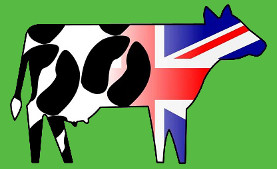By Blowey, Roger W. and Brown, Jennifer M. and Carter, Stuart D. and Demirkan, Ibrahim and Evans, Nicholas J. and Hart, C. Anthony and Murray, Richard D. and Vink, W. Daan, Veterinary Microbiology, 2008
Research Paper Web Link / URL:
http://www.sciencedirect.com/science/article/pii/S0378113508000023
http://www.sciencedirect.com/science/article/pii/S0378113508000023
Description
Bovine digital dermatitis (BDD) is a severe infectious cause of lameness which has spread through dairy cattle populations worldwide, causing serious welfare and agricultural problems. Spirochetes are the main organisms implicated and have previously proven difficult to isolate. This study aimed to isolate and characterise the range of spirochetes associated with BDD in the UK. Twenty-three spirochete isolates were obtained from 30 BDD lesions, which by 16S rRNA gene and flaB2 gene analysis clustered within the genus Treponema as three phylogroups; groups 1 (Treponema medium/Treponema vincentii-like), 2 (Treponema phagedenis-like) and 3 (Treponema denticola/Treponema putidum-like). The treponemes displayed large genotypic and phenotypic diversity between phylogroups and differed from named treponeme species. A previously isolated contagious ovine digital dermatitis spirochete was located within one of the three phylogroups, group 3, and could also be identified within this group on the basis of phenotype testing, suggesting BDD and contagious ovine digital dermatitis may share the same aetiological agent. A strain isolated from a bovine interdigital dermatitis lesion, could be identified as part of BDD isolate group 2, suggesting bovine interdigital dermatitis and BDD may have the same causative agent. Two common enzyme activities, C4 esterase and C8 esterase lipase, were identified in all BDD associated treponemes suggesting common metabolic pathways for sharing this novel niche or even common virulence traits. Further studies are required to determine whether the three groups of novel treponemes are representative of new treponeme taxa and to delineate how they interact with bovine tissues to cause disease.
Bovine digital dermatitis (BDD) is a severe infectious cause of lameness which has spread through dairy cattle populations worldwide, causing serious welfare and agricultural problems. Spirochetes are the main organisms implicated and have previously proven difficult to isolate. This study aimed to isolate and characterise the range of spirochetes associated with BDD in the UK. Twenty-three spirochete isolates were obtained from 30 BDD lesions, which by 16S rRNA gene and flaB2 gene analysis clustered within the genus Treponema as three phylogroups; groups 1 (Treponema medium/Treponema vincentii-like), 2 (Treponema phagedenis-like) and 3 (Treponema denticola/Treponema putidum-like). The treponemes displayed large genotypic and phenotypic diversity between phylogroups and differed from named treponeme species. A previously isolated contagious ovine digital dermatitis spirochete was located within one of the three phylogroups, group 3, and could also be identified within this group on the basis of phenotype testing, suggesting BDD and contagious ovine digital dermatitis may share the same aetiological agent. A strain isolated from a bovine interdigital dermatitis lesion, could be identified as part of BDD isolate group 2, suggesting bovine interdigital dermatitis and BDD may have the same causative agent. Two common enzyme activities, C4 esterase and C8 esterase lipase, were identified in all BDD associated treponemes suggesting common metabolic pathways for sharing this novel niche or even common virulence traits. Further studies are required to determine whether the three groups of novel treponemes are representative of new treponeme taxa and to delineate how they interact with bovine tissues to cause disease.
We welcome and encourage discussion of our linked research papers. Registered users can post their comments here. New users' comments are moderated, so please allow a while for them to be published.
